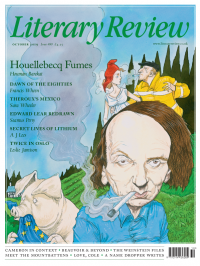David Wheatley
Hope Sings Eternal
The Music of Time: Poetry in the Twentieth Century
By John Burnside
Profile 508pp £25
‘It is difficult/to get the news from poems/yet men die miserably every day/for lack/of what is found there,’ wrote William Carlos Williams. Debates about poetry have a habit of standing in for larger discussions about culture as a public good or private indulgence, and artists as virtuous citizens or irresponsible loners. Like a washing machine on spin cycle, the argument will typically pass through the ‘unacknowledged legislators of the world’ phase, followed by the ‘poetry makes nothing happen’ phase, before (these days) coming gently to rest on the latest crop of young poets posting their work on Instagram.
John Burnside’s The Music of Time aims to engage directly with these cultural anxieties. Following on from his colleague Don Paterson’s The Poem: Lyric, Sign, Metre (and raising the terrifying prospect that the University of St Andrews has instructed all its members of staff to produce large volumes of poetics), it is billed as an ‘account of poetry in the twentieth century’. If it is, it’s a highly selective one, framed as a series of personal and philosophical meditations with intermittent ventures into memoir.
The opening chapter reveals the scale of the task Burnside has set himself. Testing Auden’s elegy for Yeats against the grandiose delusions of the Irish writer, he reminds us that ‘the poet is not a foot soldier in some predictable societal battle’, but must be content with the

Sign Up to our newsletter
Receive free articles, highlights from the archive, news, details of prizes, and much more.@Lit_Review
Follow Literary Review on Twitter
Twitter Feed
Alfred, Lord Tennyson is practically a byword for old-fashioned Victorian grandeur, rarely pictured without a cravat and a serious beard.
Seamus Perry tries to picture him as a younger man.
Seamus Perry - Before the Beard
Seamus Perry: Before the Beard - The Boundless Deep: Young Tennyson, Science, and the Crisis of Belief by Richard Holmes
literaryreview.co.uk
Novelist Muriel Spark had a tongue that could produce both sugar and poison. It’s no surprise, then, that her letters make for a brilliant read.
@claire_harman considers some of the most entertaining.
Claire Harman - Fighting Words
Claire Harman: Fighting Words - The Letters of Muriel Spark, Volume 1: 1944-1963 by Dan Gunn
literaryreview.co.uk
Of all the articles I’ve published in recent years, this is *by far* my favourite.
✍️ On childhood, memory, and the sea - for @Lit_Review :
https://literaryreview.co.uk/flotsam-and-jetsam